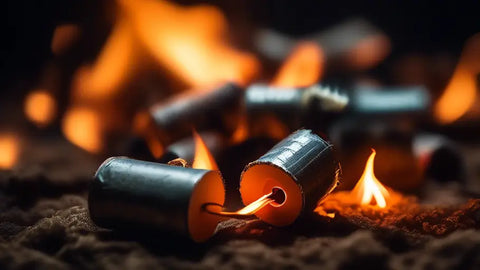In an era where our climate is rapidly changing and natural resources are being depleted, the importance of eco-friendly practices cannot be overstated. The need to reduce our carbon footprint is becoming more crucial, not just for us, but for generations to come. One of the ways we can contribute to this global initiative is by rethinking commonplace habits, like the way we start our fires.
Traditional fire starters, such as petroleum-based and chemical starters, have been widely used for decades. However, their detrimental impact on the environment is often overlooked. They contribute significantly to carbon emissions, pollution and are derived from non-renewable resources. As such, there's a growing need for eco-friendly alternatives that can still get our fires roaring but without the adverse effects on Mother Nature.
Traditional Fire Starters and Their Environmental Impact

The use of petroleum-based fire starters
Petroleum-based fire starters, like lighter fluid and kerosene, are popular due to their high energy content and effectiveness. However, they pose significant environmental challenges. These starters produce high levels of carbon dioxide when burned, contributing to the greenhouse effect and climate change.
Moreover, petroleum is a non-renewable resource, meaning it cannot be replaced once used. Its extraction and production are also linked to environmental degradation, including habitat destruction and oil spills. Additionally, the transportation of petroleum products results in further carbon emissions, reinforcing our reliance on fossil fuels.
The use of chemical fire starters
On the other hand, chemical fire starters, often found in solid cubes or liquid form, contain harmful substances like benzene and formaldehyde. These chemicals can have various negative health effects on humans and wildlife, from minor irritations to severe diseases like cancer.
The disposal of these starters also leads to environmental pollution. When discarded improperly, these chemicals can seep into the ground, contaminating water sources and harming aquatic life. Hence, the use and disposal of chemical fire starters ultimately contribute to the degradation of our environment.
Eco-friendly Fire Starter Alternatives
Natural fire starters
One of the simplest and most accessible alternatives to traditional fire starters is using natural materials. Items like pinecones, twigs, and dried leaves make excellent fire starters. They are renewable, biodegradable, and do not contribute to pollution like their traditional counterparts. Furthermore, these materials can often be locally sourced, reducing the carbon emissions associated with transportation.
However, remember that it's vital to source these materials responsibly. For instance, in using hardwood ash logs, ensure they come from sustainable sources that protect forests and support ecosystems.
DIY fire starters
You can also create your own fire starters using everyday household items. For example, you can make newspaper rolls, use egg cartons filled with sawdust or even lint from your dryer. Making your own fire starters not only helps in reducing waste but can save you money too.
It's crucial, however, to use non-toxic materials in your DIY fire starters. Avoid materials that release harmful fumes when burned to ensure your fire is both safe and eco-friendly.
Renewable fire starter products
Several commercially available fire starter products are made from renewable materials like wax, wood chips, and even coconut shells. These products, such as kiln-dried wood and lumpwood charcoal, are a great way to reduce carbon emissions and support sustainable industries.
Companies are also producing innovative products like Swedish fire logs, candles, and torches, which are made from sustainably sourced wood and have a low carbon footprint.
Electric fire starters
Electric fire starters mark a significant departure from traditional methods. Instead of using fuel, they rely on electricity to generate heat. This not only cuts down on emissions associated with burning fuel but also makes them incredibly convenient and easy to use.
However, it's essential to ensure that your electric fire starter is energy efficient to maximize its environmental benefits.
Best Practices for Using Eco-friendly Fire Starters

Proper storage and disposal
Storing your fire starters in a dry and secure place is crucial to maintain their effectiveness and prevent degradation. When it comes to disposal, many eco-friendly fire starters can be composted or recycled, reducing waste.
However, improper storage or disposal can lead to potential hazards. Ensure to follow the manufacturer's guidelines or local regulations for disposal to avoid any environmental harm.
Safety precautions
Safety should always come first when dealing with fire. Always follow safety precautions when using fire starters. This includes lighting the fire safely, keeping it under control, and ensuring it is completely extinguished before leaving it unattended.
Remember to also have firelighters & kindling on hand for a controlled start. They are not only easy to use but also burn cleanly and efficiently.
Conclusion
In conclusion, eco-friendly fire starters present a viable and sustainable alternative to traditional methods. They help to reduce our carbon footprint, protect the environment, and promote sustainable practices.
We encourage you to make the switch to these eco-friendly alternatives and share your experiences with others. It's through collective action that we can make significant strides in caring for our planet.
For more information on eco-friendly practices and fire safety, look to resources like Sustainable Wood: A Renewable Resource Protecting Forests and Supporting Ecosystems and Wood Fuels. These resources provide valuable insights into the benefits of sustainable wood and how to use it responsibly for your fire needs.
After all, it's in our hands to ensure the warmth of our fires doesn't contribute to the heat of the planet. So, are you ready to ignite a change?

